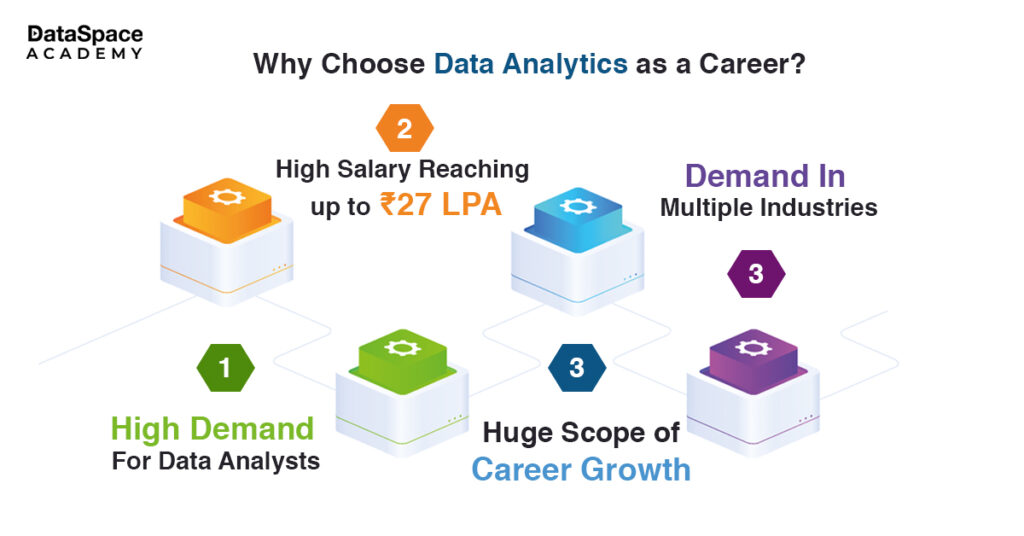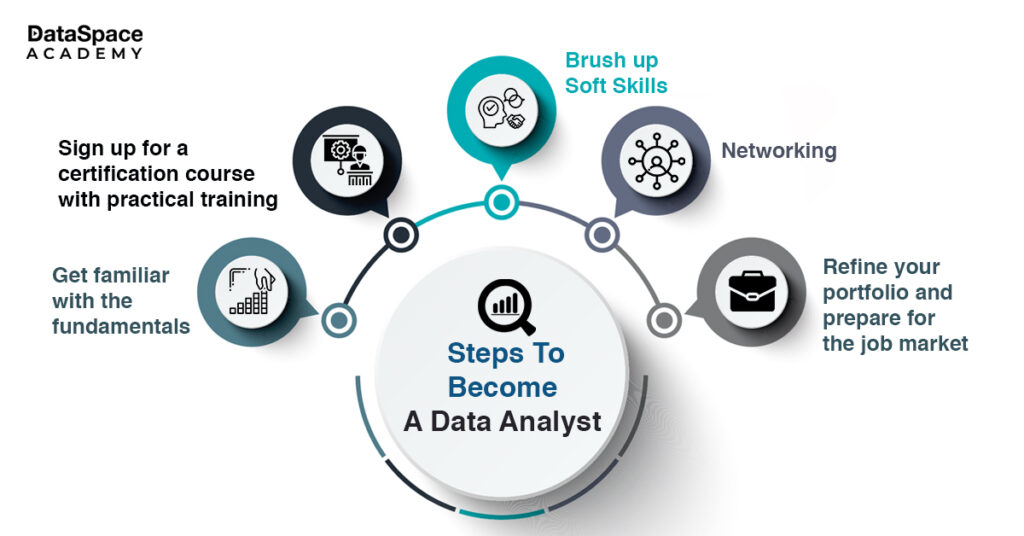1.7 MB of data per second!!
Yes, each day we generate 1.7 MB of data per second! According to a recent market report, it is estimated that by 2025, the data market will be worth $229.4 billion USD (source: statistia.com). With an increasing focus on data-driven operations, every industry is looking for a
data analyst who can analyse and derive actionable insights from data. Demand for skilled data professionals - especially data analysts - has witnessed a 45% increase in the Indian market (source:
educationtimes.com).
Data analysts play a crucial role in extracting valuable insights from large datasets, transforming raw data into meaningful information. This information is later used for deriving strategic decisions that can help businesses serve their customers better. Their work contributes directly to the success and profitability of businesses, making them an indispensable part of the company.
Data analysis is an exciting and dynamic career domain with immense growth potential. Entry-level analysts can earn around ₹6 to ₹8 LPA, while experienced ones make something between ₹18 to ₹30 LPA.
With every click, purchase, and interaction generating valuable data for the organisation, the demand for skilled data analysts continues to soar. The blog explores why data analytics is an excellent career option and how you can build a successful career in this domain.
A data analyst collects, cleans, analyses, and interprets raw data to draw out meaningful, actionable insights. They help organisations to process data to uncover patterns, trends, and relationships within datasets. This information enables organisations to gain valuable insights into various departments, such as customer behaviour, market trends, and other major parameters. These data-driven insights further help businesses undertake suitable business decisions.
Data analysts are largely in demand across different industries including finance, healthcare, retail and manufacturing. In finance and banking, they work on data to identify fiscal risks, optimise investments, and improve overall financial performance. In the retail industry, data analysts help understand consumer preferences and forecast demand. For the healthcare industry, data analysts work on finding meaningful insights from a thorough analysis of patient records and medical data.
Each organisation collects data to understand its customers better and develop dedicated business solutions for them. But, a huge part of the data gathered is cluttered and needs expert cleaning to glean valuable insights. Thus, businesses are in urgent need of data analysts who can process the information into valuable, evidence-based insights.
Here are a few reasons why data analytics is a great career option -

You need a college degree in mathematics, statistics, or computer sciences (preferably) to build a career in
data analysis and data analytics. Since data analysts work in multiple disciplines, they must develop various hard and soft skills to make it in the industry. Here are a few hard and soft skills that are a must-have for a data analyst:
Dataspace Academy’s
Certification in Data Analytics program is open to learners from all domains, including non-technical ones. This job-ready data science course introduces a learner to data visualisation, data cleaning, and data mining tools. Learners are also introduced to Python programming, SQL, and statistics as well. The program involves hands-on training to help learners develop practical skills for the real-world workspace.
Data analytics is one of the most promising careers of this decade. Ideally, you need to dedicate 12 to 14 weeks to learn the basics skills. However, it’s imperative to garner hands-on experience to develop professional expertise and scale up your career.
Here is a detailed roadmap for anyone trying to build a data analyst career from scratch.

A career in data analytics offers endless possibilities for both professionals as well as freshers. Companies from different sectors are hiring data analysts who can help them with analysing the data sets and uncovering hidden patterns. And these corporations are willing to offer generous salaries and additional perks to the right talent. By honing your analytical skills and staying up-to-date with industry trends, you too can build a rewarding career in this domain.
If you have a passion for uncovering patterns, a curiosity to explore hidden connections, and a drive to make an impact, then Dataspace Academy can help you build a career in this domain. Get ready to unleash the power of insights and embark on a fulfilling career as a data analyst. Our beginner-friendly, 6 months-long Certification in Data Analytics program is the perfect launch pad for data analytics enthusiasts. This course comes with a dedicated online/offline class schedule and exclusive hands-on training that can help you develop essential
data analyst qualifications.
So, what are you waiting for? Join us now!!



